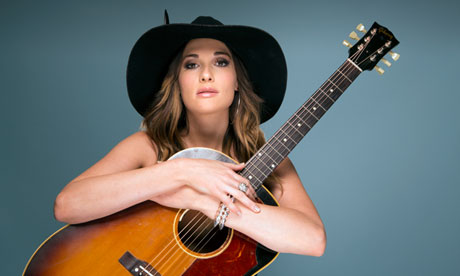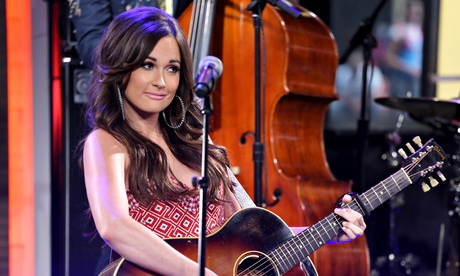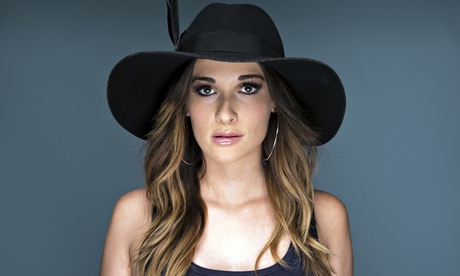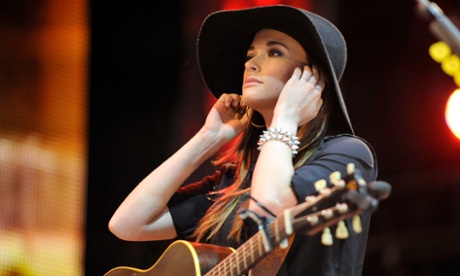Kacey Musgraves stands onstage at the Arts Club in central London and absent-mindedly worries the tuning pegs of her guitar. "Hope y'all don't mind depressing country music," she twangs. There are a few titters from the crowd; the venue comfortably holds about 100, but because of the excitable reviews for Musgraves's new album, Same Trailer Different Park, the room is crammed with perhaps double that.
The song she plays is called It Is What It Is. On first listen, it is an old-fashioned country ballad that could have been written any time in the past 50 years. Musgraves's cool, clear voice rings out over the slow, pared arrangement as she apparently tells a tale of love, loss and regret. But It Is What It Is is nothing of the sort. It's about no-strings-attached sex, getting together with someone because you both have nothing better to do. As she proposes another hook-up, Musgraves pines: "Maybe I love you/ Maybe I'm just kind of bored/ It is what it is."
As she strums the final chord, Musgraves announces: "My grandma calls that one The Slut Song."
It's a line she's used before, but it neatly sums up the dichotomy that Musgraves presents. She looks like a cookie-cutter breakthrough country artist: tonight she wears a wide-brimmed black fedora with a feather in the band, gold hoop earrings and a leopard-print shirt with a sprinkling of rhinestones on the collar. She's pretty and, from a particular angle, looks like Pippa Middleton. For the most part, Musgraves's music sounds like traditional country, too. There are banjos and harmonicas, songs harking back to the old-time tunes she grew up listening to in Golden, Texas (population: 600).
But lyrically, mainstream country has never seen anyone quite like Musgraves. This is a world, after all, where a man's most enduring relationship is often with his pick-up truck (That Ain't My Truck, Take a Little Ride and Pickup Man being just a small sample of songs that celebrate this love affair). The heartland is religious, monogamous and conservative with any kind of "c".
The 25-year-old Musgraves is certainly not the first to have rebelled against these traits – the Dixie Chicks, Gretchen Wilson and Miranda Lambert have all taken stands – but her assault is particularly threatening. Not only does she believe you should have sex with who you want, when you want; another of her songs (Follow Your Arrow) approves of smoking joints and gay relationships. Her biggest hit to date, Merry Go 'Round, is a witty and savage takedown of the kind of small town where she's from and where many of her fans probably still live.
All this might not sound especially subversive, but it is only 10 years since the Dixie Chicks faced death threats and had to install metal detectors at their live shows because of quite restrained comments at a gig in London about George W Bush and the war in Iraq. A pair of radio DJs in Colorado were subsequently suspended for playing their music, while a poll for an Atlanta station found that three quarters of their listeners would return their Dixie Chicks CDs if they could.
Musgraves, however, is finding the ride somewhat smoother. Same Trailer Different Park, supported by glowing reviews in Rolling Stone and the New York Times, went to No 2 in the US charts (and topped the country listings). Merry Go 'Round was praised by Katy Perry and a song that Musgraves co-wrote, Undermine, was played on the TV series Nashville, shown in the UK on Channel 4. Comparisons to the breakthrough of Taylor Swift, the crossover golden girl of country music, inevitably followed.
Playing a song such as Follow Your Arrow could probably still get a DJ suspended from an American country music station, but Musgraves and her management are wondering whether they even need the validation of those kingmakers any more. This is part of the reason why the singer-songwriter came to London for the second of three visits to the UK in 2013. Musgraves wants people who would never ordinarily think of listening to a country record to buy her album – and that includes us: British people. Country music is blowing up, she believes, and her sights are set far beyond Nashville.
A few hours before her showcase at the Arts Club – populated by industry wonks and journalists, intended to increase interest in her UK tour in October – I meet Musgraves at her hotel. The room assigned for our interview is a windowless, fluorescent-lit and instantly depressing conference suite that she decides reminds her too much of bad experiences in co-writing. "It's like an awkward first date sometimes: you've never met this person and you have to make magic happen in the span of a few hours," she says. "People have these dreams of it being so bohemian and it's so not." We move outside and sit, incongruously but not unpleasantly, in a dim corridor.
Many of Musgraves's lyrics – she wrote every track on Same Trailer Different Park, though each has a co-writer – seem inspired by where she grew up, so it seems appropriate to start there. Golden, Texas has one main street with a post office, "five-and-dime" general store and an art gallery run by her aunt. The town has local renown for sweet potatoes and this has grown into an annual festival each October. "It's actually really fun," says Musgraves. "All these old ladies get together and they have sweet potato pie-cooking contests and they crown a Sweet Potato Queen and a Little Miss Tater Tot."
Did she have success in either of those competitions? "I definitely tried out for the Little Miss Tater Tot. I'm pissed that I didn't get it. I don't know what the hell happened, but I'm still bitter."
Golden is the picture of a strait-laced town evoked by country-music songs, but her family always had more eclectic tastes: Neil Young, Tom Petty, the Beach Boys, the Spice Girls. "God, I loved them," shrieks Musgraves. "I was such a big fan. I had a Ginger Barbie, though some of the things she did irked me." She doesn't care to elaborate further. They could see the church from their stoop, but she only attended when it was "socially mandatory", such as Easter and Christmas.
On Saturday nights, the Musgraves clan would decamp to local oprys around Texas, where Kacey would perform traditional, crowd-pleasing material. "When I was nine I was singing western swing, Roy Rogers and Patsy Cline," she recalls. "It got me noticed because no one my age was doing it, but it made me feel inferior because none of my friends could relate to it."
There is a strong sense on Same Trailer Different Park – starting from that title – that Musgraves had long been counting the days before she could leave small-town life. "I feel there's good intentions and a good heart," she says. "But I never saw myself graduating high school and living there. I had no idea what I'd do there – work in a restaurant or something – and I would have really struggled to be happy if I'd just stayed. Some of my friends are still there, I guess trying to figure out what they want to do. But I had a reason to go somewhere: music."
So Musgraves left Golden – having been voted "Most Likely to Become Famous" in her high school – and went to Austin, the liberal enclave of Texas. Aged 19, she was selected for the 2007 intake of the reality show Nashville Star – Pop Idol for country music, presented by Jewel – but she was eliminated in the third week, finishing seventh out of 10. "There was truth to what the judges told me," Musgraves concedes now. "I'm just really glad that more people don't remember me from that because I just didn't know who I was: my voice was different, I looked different."
By this time, Musgraves had already laid down three albums: Movin' On, Wanted: One Good Cowboy and Kacey Musgraves. These records are not especially easy to track down today; again, something that the upwardly mobile Musgraves is not unhappy about.
What changed then? The turning point, Musgraves thinks, was moving to live in Nashville, Tennessee. "Every person there is there for music," she says. "The person sitting at the table next to you is probably a hit songwriter. You could throw a rock in a room and hit a great songwriter. The guy that is literally homeless on the street playing for money is probably better than me – in technical ways or whatever. You have no room to not be the best you can be. It lights a fire under you, for sure."
It certainly wasn't always easy in Nashville: she wrote hundreds of songs, some for herself, but most for other singers. She did odd jobs, "odd" being the operative word: one of these required her to dress up as Cinderella and paint faces at children's birthday parties, but she quit that when the company asked her to deliver balloons to an industry bash dressed as a French maid. Slowly, however, the experiences coalesced into the smart, caustic worldview of the new record.
"I guess it's a combination of moving away from home, living out of state, being put in weird situations," says Musgraves. "I had break-ups, get-back-togethers, my room-mate came out to me. Just living life, smoking weed, changing my perspective. Meeting people that I really clicked with and doing that over and over.
"In the beginning, I wrote OK songs, but they didn't have a unique perspective," she continues. "I had songs that would have worked for a female country singer, but it was boring to me because it had already been done. Like the angry female song: you left me and I'm angry about it. People would probably like that and it's not a bad song but I'm not an angry female. I have moments where I am, but I feel like that's a shtick in country music."
Just as Musgraves was changing, so was country music. Shania Twain, Faith Hill and LeAnn Rimes all had success in the pop charts, but the scene was blown apart with the emergence of Taylor Swift. Her second album, Fearless, was the best-selling record in the United States in 2009 and won her four Grammys. While her debut had referenced God and pick-up trucks, Swift's slick and commercial new direction began to attract listeners from every genre. With her third and fourth albums, she became the fastest-selling musician on the planet. The Washington Post called her the "poet laureate of puberty" while the New Yorker praised her for turning "teen angst into a business empire".
Musgraves isn't Swift, but she has a certain admiration for the breadth of her appeal. "She's definitely widened the audience," says Musgraves. "I think a lot of kids who wouldn't be into country are probably fans of hers. That's cool and she's been kind of an ambassador for country."
There is a slick operation behind Musgraves – her label is Mercury Nashville, owned by the Universal Music Group – and you sense they are happy for her to be positioned as an edgier, more grown-up take on Swift. Musgraves herself notes that she has started seeing a lot more people in their 20s and 30s at her gigs, a demographic that country musicians often struggle to attract.
"Certain kinds of people will always have an issue with my music," says Musgraves. "But that's fine, it's OK. I don't want to be the McDonald's of music. I don't want to not turn anyone off. If you were everybody's cup of tea, you'd probably be boring.
"I don't feel that the songs I sing and the music I make are very subversive, but I can see how it would be to some people," she goes on. "The things I sing about are just what inspires me and what I've been exposed to in my life. It's not like I've thought, Ooh, this is a button pusher!"
Still, there is obvious disappointment in Musgraves's voice as she discusses Follow Your Arrow. At various times, she has lobbied for it to become the next single release, but each time older heads have told her that it would be suffocated by a lack of radio airplay (the right-leaning Clear Channel is the biggest player in the US radio with 243 million monthly listeners). Apparently the exuberant chorus – "So make lots of noise/ Kiss lots of boys/ Or kiss lots of girls/ If that's something you're into" – would not be widely appreciated in the southern states.
"Follow Your Arrow is hands down people's favourite off the record," says Musgraves. "It's the one they instantly recognise or freak out about. Whether or not they like country music they seem to really like and relate to that song. But even with all of that, and country radio always looking for its next hit, they are still scared of it. Most radio programme directors that I talk to say, 'That's my favourite, I wish we could play it.' I'm like, 'Well then, fucking play it!'"
Musgraves's voice spikes with obvious passion but then she catches herself. "I just hate that people are scared of it," she sighs. "But I don't want to be begging. I don't want to be at the mercy of country radio with it. It's gonna have its own life regardless, so I don't really want to ask their permission."
The old guard of country music might not like it, but Kacey Musgraves – to steal her own sentiment – is what she is.
Same Trailer Different Park is out now. Kacey Musgraves tours the UK in October
New sweethearts of the rodeo: the female country stars determined to break the mould
MIRANDA LAMBERT
It's arguable that the seeds for country's current crop of straight-shooting radical female voices were first planted in the unlikely environment of Nashville Star. A country take on American Idol, the first of its six seasons was won in 2003 by the long-since-disappeared Buddy Jewell. Third-placed Miranda Lambert, though, made no secret of her desire to rock the boat – and over the course of her five-album career she's been country's own avenging fury. She spent her 2007 album, Crazy Ex-Girlfriend, reclaiming the power of that dismissive epithet, most notably on domestic violence revenge fantasy Gunpowder & Lead: "His fist is big, but my gun's bigger." But she showed that time hasn't mellowed her on this year's Mama's Broken Heart, in which song and video find her raking her nails down the sides of Stepford social mores.
PISTOL ANNIES
In 2011 Lambert joined forces with fellow country singer-songwriters Ashley Monroe and Angaleena Presley correctto form Pistol Annies. Their debut full-length, Hell on Heels, found them giving voice to third-generation bartenders, drug-addicted housewives and devilish gold-diggers. Alternating between chipper middle fingers aimed at conservative values and bleak, heartbreaking evocations of rural poverty, it stands as one of this era's finest recession albums. This year, the group's follow-up, Annie Up, found them taking aim at the beauty industry and nuclear family hypocrisy; meanwhile, Monroe's second solo album, Like a Rose, finds her indulging in weed and booze – but most movingly, gently reframing an old misogynistic slur on Used.
BRANDY CLARK
As a songwriter for Lambert, Kacey Musgraves, the Band Perry and more, Brandy Clark has proved adept at getting into other people's heads. Her own debut album, 12 Stories (released on 22 October), displays the full range of her emotional acuity and wit in dissecting the strung-out, pill-addicted, adulterous heart of small-town America. There's a feminist twist to Clark's songwriting: "Crazy women are made by crazy men," she notes pointedly. Generally, she is one of life's fatalists: Take a Little Pill and Illegitimate Children are desert-dry and bleak with it. But she can also pack an emotional punch that leaves you gasping: the suspenseful ballad What'll Keep Me Out of Heaven finds its narrative on the verge of a life-changing decision, while Just Like Him explores the legacy of a broken home in heartbreaking detail. Clark is also openly lesbian: a significant rarity in Nashville's tight-knit country community.
SUNNY SWEENEY
Sunny Sweeney spent her formative years working dead-end jobs in New York before returning to the south to start her singing career. It began controversially, with Sweeney accused by fans of endorsing adultery: her breakthrough 2010 hit, From a Table Away, was a masterfully crafted narrative of the moment a man's mistress realises she is destined to remain merely that. Amy – another highlight of Sweeney's second album, Concrete – confirmed Sweeney's predilection for giving a voice to the villain of the piece, retelling the story of Dolly Parton's Jolene from the other woman's perspective. Sweeney is crowdfunding the creation and release of her third album. Alex Macpherson











